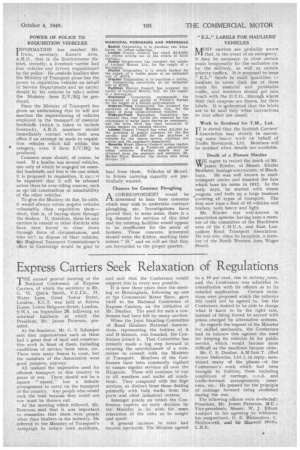Express Carriers Seek Relaxation of Regulations
Page 19

If you've noticed an error in this article please click here to report it so we can fix it.
TIIE annual general meeting of the 1 National Conferenc:e of Express Carriers, of which the secretary is Mr. G. W. Quick Smith, F.C.I.S., 17, Water Lane, Great Tower Street, Landon, E.C.3, was held at Kelvin House, Lower Belgrave Street, London, S.W.1, on Septeniber 26, following an informal luncheon at which the President, Mr. James Paterson, presided,
At the luncheon, Mr. G. S. Szlumper said that organizations such as these had a great deal of hard and constructive work in front of them, including conditions of service, basic rates, etc. There were many fences to cross, but the members of the Association were good jumpers, anyway. All realized the imperative need for efficient transport in this country in peace or war. There should not be a square "squeal," but a definite arrangement to carry on the transport of the country. Any people who would rock the boat because they could not row must be thrown out.
At the meeting which followed, Mr. Paterson said, that it was important to remember that there were people other than hauliers in the industry. He referred to the Ministry of Transport's campaign to reduce road accidents, and said that the Conference would support this in every way possible.
It is now three years since the meeting at Birmingham, following up one at the Commercial Motor Show, gave birth to the National Conference of Express Carriers, on the initiative of Mr. Dunbar. The need for such a conference had been felt by many carriers.
When the Joint Standing Committee of Road Hauliers National Associations, representing the holders of A and B licences, was founded, the Conference joined it. That Committee has recently made a big step forward in securing the establishment of a corn-. mittee to consult with the Ministry of Transport. Members of the Conference have been constantly vigilant to ensure regular services all over the Kingdom. These will continue to run in all weathers and "under all conditions. They compared with the litter services, as distinct from, those dealing primarily with bulk traffic from the ports and chief industrial centres.
Amongst points on which the Conference expects an early decision by the Ministry is its wish for some relaxation of the rules as to weight and speed.
A general increase in rates had become inevitable. The Minister agreed to a 10 per cent, rise in railway.ra.tes, and the Conference was admitted to consultation with its officers as to its
detailed application. Certain variations were proposed which the railways felt could not be agreed to, but the Conference desired to be able to charge what it knew to be the right rate, instead of being forced to accord with prices charged by alternative systems.
As regards the request of the Minister for skilled mechanics, the Conference had to balance this against the need for keeping its vehicles fit for public service, which would become more difficult as the machines became older.
Mr. C. S. Dunbar, A.M,Thst.T. (Red Arrow Deliveries, Ltd.), in reply, mentioned many of the phases of the Conference's work which had been brought to fruition, these including conditions of carriage, c.o.d. and traffic-forward arrangements, insurance, etc. He pressed for the principle of carriage forward being abolished during the war.
The following officers were re-elected : President, Mr. James Paterson, M.C. ; Vice-presidents, Messrs. W. J. Elliott (subject to his agreeing to withdraw his resignation), D. E. RIchardson, C. Holdsworth, and Sir Maxwell Hicks, C B. E.




















































